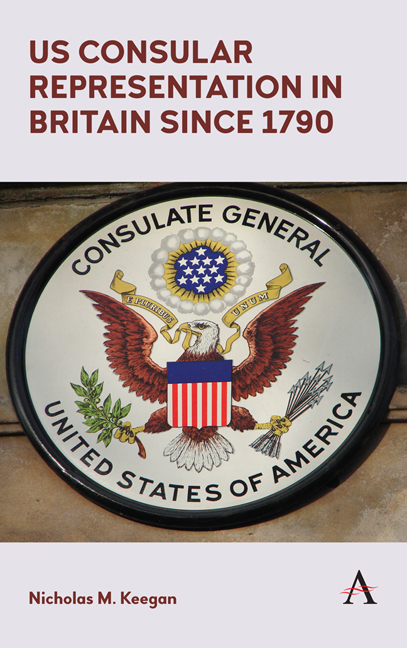Book contents
- Frontmatter
- Dedication
- Contents
- List of Illustrations
- Foreword
- Preface
- Acknowledgements
- Introduction
- PART 1
- PART 2
- PART 3
- Chapter Six Consular Posts and Consular Agencies in Major Cities
- Chapter Seven Belfast
- Chapter Eight Birmingham
- Chapter Nine Bradford
- Chapter Ten Bristol
- Chapter Eleven Cardiff
- Chapter Twelve Dublin
- Chapter Thirteen Dundee
- Chapter Fourteen Dunfermline
- Chapter Fifteen Edinburgh and Leith
- Chapter Sixteen Falmouth
- Chapter Seventeen Liverpool
- Chapter Eighteen London
- Chapter Nineteen Newcastle upon Tyne
- Chapter Twenty Southampton
- Chapter Twenty-One Stoke on Trent
- Chapter Twenty-Two An Evolving, Adaptive Service
- Appendix: Locations and Categories of Consular Offices
- Notes
- Sources
- Bibliography
- Index
Chapter Ten - Bristol
from PART 3
Published online by Cambridge University Press: 21 June 2018
- Frontmatter
- Dedication
- Contents
- List of Illustrations
- Foreword
- Preface
- Acknowledgements
- Introduction
- PART 1
- PART 2
- PART 3
- Chapter Six Consular Posts and Consular Agencies in Major Cities
- Chapter Seven Belfast
- Chapter Eight Birmingham
- Chapter Nine Bradford
- Chapter Ten Bristol
- Chapter Eleven Cardiff
- Chapter Twelve Dublin
- Chapter Thirteen Dundee
- Chapter Fourteen Dunfermline
- Chapter Fifteen Edinburgh and Leith
- Chapter Sixteen Falmouth
- Chapter Seventeen Liverpool
- Chapter Eighteen London
- Chapter Nineteen Newcastle upon Tyne
- Chapter Twenty Southampton
- Chapter Twenty-One Stoke on Trent
- Chapter Twenty-Two An Evolving, Adaptive Service
- Appendix: Locations and Categories of Consular Offices
- Notes
- Sources
- Bibliography
- Index
Summary
The city of Bristol in south-west England was an important port, particularly for the shipping of tobacco and port wine, and for the slave trade. The first United States consulate in the city was opened in 1792, headed by Elias Vanderhorst. Contrary to the claim on the official plaque on a house at 37 Queen Square, Bristol was not the location of the first US consulate in Britain. As is shown in the history of the Liverpool consulate, that honour goes to Liverpool in 1790. Vanderhorst was a South Carolinian who in his mid-thirties had moved with his wife and family to Bristol in 1774, continuing as a merchant the business that he had pursued in America. Some eighteen years later he was appointed consul by President George Washington. His commission of appointment, signed by Washington and co-signed by Secretary of State Thomas Jefferson, dated 4 May 1792, is in the archives of the Bristol Record Office. His exequatur was signed by King George III on 10 February 1793. Vanderhorst declined renewal of his appointment on 2 October 1815 due to infirm health, informing John Quincy Adams, the American minister in London of this, and died seven months later in May 1816.
Harman Visger, of New York, who succeeded Vanderhorst in 1816, was already living in Bristol and was ‘a rich merchant, an American […] [with] a family of seven children’. The consulate was now located at 6 Brunswick Square. Visger died in office, in Ilfracombe, on 4 June 1833, and was succeeded temporarily by his son Harman Visger, Jr, until 1834, when Thomas Dennison, of Pennsylvania, who had served in the consulate at Liverpool from 1833 until 1834, took over. He remained until 1841 when Francis Barber Ogden, of New Jersey, was appointed. Up to that time Ogden had been consul in Liverpool from 1829. Throughout his time as consul he was a pioneer in the use of nautical steam engines. In addition to his Bristol appointment he was consul for the Republic of Texas in Liverpool (see the item on the Texas Consular Service in Chapter 4). In 1852, he was appointed consul in Manchester but retained his Bristol connection. He died there in office on 4 July 1857 and was buried in Arnos Vale Cemetery, Brislington. Like Visger, he was succeeded by his son, but on a permanent basis.
- Type
- Chapter
- Information
- US Consular Representation in Britain since 1790 , pp. 115 - 118Publisher: Anthem PressPrint publication year: 2018



